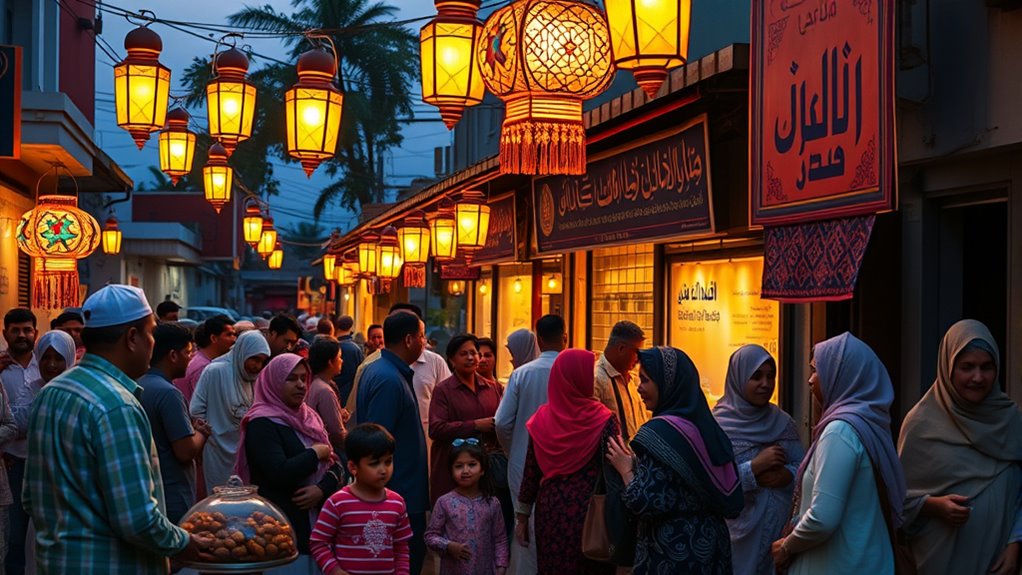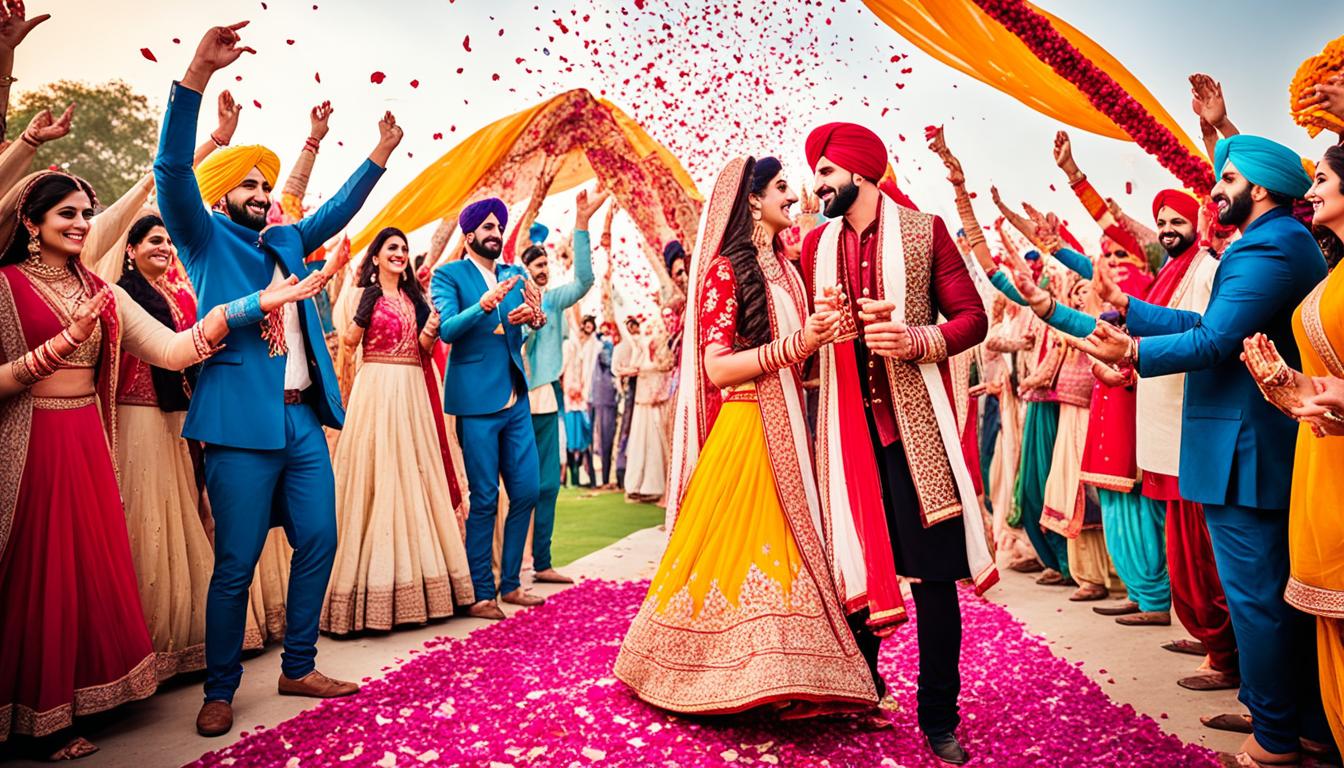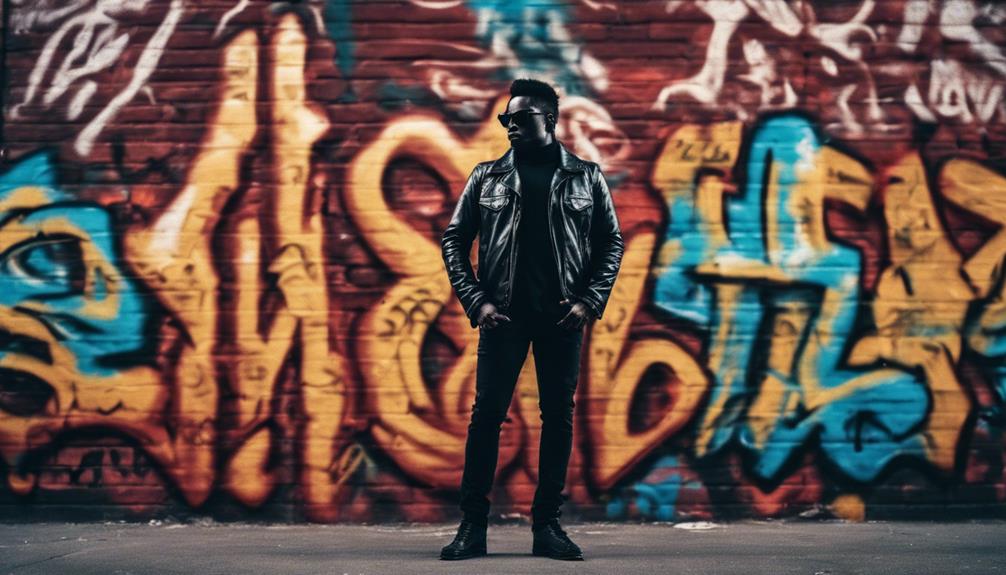During Ramadan, you’ll experience fasting from dawn to sunset, which helps you cultivate patience, gratitude, and empathy for others. It’s a time to strengthen your faith through prayer, reading the Quran, and acts of charity, fostering inner peace and personal growth. Community plays a key role with shared meals, prayers, and traditions that reinforce bonds. If you keep exploring, you’ll discover how Ramadan brings meaningful reflection, renewal, and connection on many levels.
Key Takeaways
- Ramadan is a sacred month focused on spiritual reflection, fasting, and strengthening faith and community bonds.
- Fasting from dawn to sunset teaches patience, gratitude, and empathy for others.
- Increased prayer, Quran reading, and charity deepen spiritual growth during Ramadan.
- Community traditions like Tarawih prayers and sharing meals foster social unity.
- Ramadan offers opportunities for personal renewal, compassion, and cultural connection.

Have you ever wondered what Ramadan is and why millions of Muslims around the world observe it each year? Ramadan is a sacred month that’s deeply rooted in spiritual reflection and cultural traditions. It’s a time when Muslims come together to strengthen their faith, purify their hearts, and renew their connection with God. For beginners, understanding the purpose behind Ramadan can seem overwhelming, but it’s fundamentally about creating a meaningful pause from everyday routines to focus on spiritual growth and community bonds.
During Ramadan, fasting is the most prominent practice. You refrain from food, drink, and other physical needs from dawn until sunset. This act of self-discipline isn’t just about abstaining; it’s about cultivating patience, gratitude, and empathy for those who are less fortunate. As you observe the fast, you’ll notice how it sharpens your awareness of both your body and your spiritual state. It’s a practice that encourages reflection on your priorities and helps you gain perspective on material needs versus spiritual fulfillment. The fast also serves as a reminder of the importance of compassion and charity, reinforcing the cultural traditions of giving and community support during this holy month.
Beyond fasting, Ramadan offers a unique opportunity for spiritual reflection. Many Muslims spend extra time praying, reading the Quran, and engaging in acts of charity. These activities help deepen your understanding of your faith and foster a sense of inner peace. You might find that this period encourages you to evaluate your life, seek forgiveness for past mistakes, and set intentions for personal growth. It’s a time to reconnect with your spiritual roots and develop a stronger sense of purpose. Additionally, adopting spiritual practices during Ramadan can enhance your sense of fulfillment and guide you toward ongoing personal development. The evenings often feature special prayers called Tarawih, which are performed in congregation, emphasizing the communal aspect of Ramadan. These gatherings reinforce the importance of unity and shared faith, making the experience more meaningful.
Cultural traditions also play a crucial role during Ramadan, shaping how communities celebrate and observe the month. From preparing traditional foods to sharing meals with family and neighbors, these customs foster a sense of belonging and collective identity. Whether it’s breaking the fast with dates and sweet treats or participating in community iftars, these practices help create lasting bonds. As a beginner, embracing these traditions can make the experience more authentic and enriching. They serve as a reminder that Ramadan isn’t just about individual fasting but about strengthening social ties and celebrating shared values. Overall, Ramadan offers a profound journey into faith, tradition, and community, inviting you to reflect, renew, and connect on multiple levels.
Frequently Asked Questions
Can Non-Muslims Participate in Ramadan Activities?
You can definitely participate in Ramadan activities as a non-Muslim. Engaging in interfaith dialogue and cultural exchange helps foster understanding and respect. Attend community iftar gatherings, learn about the significance of fasting, and show support for friends observing Ramadan. Your involvement demonstrates openness and helps build bridges between different faiths and cultures, enriching everyone’s experience and promoting unity during this meaningful month.
What Are Traditional Foods Eaten During Ramadan?
You might think traditional dishes during Ramadan are limited to specific cuisines, but they actually vary widely around the world. Iftar delicacies often include dates, soups, and hearty main courses like kebabs or stews. Some regions favor sweet treats like baklava or qatayef. Exploring these diverse foods reveals how cultures celebrate Ramadan with unique flavors, making it a rich, communal experience that’s both spiritual and culinary.
How Is Ramadan Celebrated in Different Countries?
You’ll notice that Ramadan is celebrated differently across countries, reflecting unique cultural variations and regional customs. In some places, you might experience grand nightly feasts, while others focus on quiet prayers and community service. In Morocco, people enjoy traditional sweets after sunset, whereas in Indonesia, vibrant markets and evening prayers are central. These diverse customs highlight how local traditions shape Ramadan, making each celebration distinct yet united in faith.
Are There Health Risks Associated With Fasting?
Fasting can be like walking a tightrope—you need balance to avoid risks. You might face hydration concerns or fasting side effects like dizziness or headaches. For example, if you skip water during long fasting hours, dehydration can hit hard. It’s essential to listen to your body, stay hydrated, and consult a healthcare professional if you experience adverse symptoms. Proper planning helps you enjoy fasting safely without health risks.
How Can I Support Friends Observing Ramadan?
You can support friends observing Ramadan by practicing cultural sensitivity and respectful communication. Check in with them about their needs, like adjusting plans around their fasting hours, and avoid eating or drinking around them during daylight. Offer encouragement and understanding, and participate in iftar gatherings if invited. Your support shows you respect their faith, making them feel appreciated and understood during this meaningful time.
Conclusion
As you begin this Ramadan journey, remember that every fast and prayer deepens your faith and connects you to a community stronger than steel. It’s a time to discover resilience within yourself that’s more powerful than any challenge life throws your way. Embrace the lessons of patience, gratitude, and unity — they’ll transform your life in ways you never imagined. Ramadan isn’t just a month; it’s a soul-shaking experience that can change you forever.









